
*Source of claim SH can remove it.
NetDooka
NetDooka is a Trojan horse virus, which is the most common type of malware at the moment. We’ve included just the most important information about NetDooka and the threats of its kind, so that you could better comprehend the problem at hand, and minimize the chances of getting infected with Trojans in the future.

Our removal manual will assist you with managing the infection effectively, and removing it from your system, in case you have been compromised. However, we suggest spending a few minutes reading this article first, before you move on to the instructions below.
What can Trojans do?
The Trojans have achieved an amazing level of popularity during the recent years because of two of their most distinctive features – the first one is their stealth, and the second one is their ability to execute a broad variety of malicious operations. Most viruses of this kind, including NetDooka, Bloom.exe, Energy.exe are generally intended to perform some kind of a specific criminal activity, while the targeted users have no idea about their presence in the system. We will mention just some of the most common uses of viruses such as NetDooka, so you get an idea of their potential uses:
- Destruction. Trojans can be used for formatting hard drives, and erasing information from your disks, thus making your computer totally empty, with none of your personal data in it
- Espionage. The hackers who create malicious programs like NetDooka can use them to spy on you. They can monitor your browsing activity, and all the activities that you do in different apps, or they can spy on you through your webcam, or listen to your discussions by hacking into your microphone. This is a big problem, particularly given the fact that your webcam can be used to help the criminals to determine what valuables you may have in your home, or how to access it easily, in order to carry out real physical offenses such as burglary.
- Data theft. Sensitive data such as online account usernames, passwords, banking credentials, etc. can also be collected using the help of a Trojan. Not only can private data be stolen to impersonate you, and to steal your identity, but also it can enable the criminals to steal money from your bank accounts.
- Virus distribution. Trojans such as NetDooka can also frequently be used as a backdoor, most commonly for Ransomware, and Spyware. The Trojan will typically be sent in a spam email attachment, and will automatically load the Ransomware to the victim’s PC once it gets downloaded on the computer.
With all this information in mind, it is more than clear that the next logical step would be to figure out how to quickly and effectively remove NetDooka, and how to secure your computer. For that we suggest you use the instructions in the removal guide below, and the assistance of the professional removal tool attached to it. For optimal protection, it would be worth considering the investment in functional, and reputed anti-malware software. We also recommend that you avoid any interactions with sketchy online advertising materials, spam, and shady web locations whenever possible, as these are the most common sources of Trojan Horse infections.
SUMMARY:
| Name | NetDooka |
| Type | Trojan |
| Danger Level | High (Trojans are often used as a backdoor for Ransomware) |
| Detection Tool |
We tested that SpyHunter successfully removes NetDooka* and we recommend downloading it. Manual removal may take hours, it can harm your system if you re not careful, and NetDooka may reinstall itself at the end if you don’t delete its core files. |
*Source of claim SH can remove it.
Remove NetDooka Malware
If you have a Windows virus, continue with the guide below.
If you have a Mac virus, please use our How to remove Ads on Mac guide.
If you have an Android virus, please use our Android Malware Removal guide.
If you have an iPhone virus, please use our iPhone Virus Removal guide

Some of the steps will likely require you to exit the page. Bookmark it for later reference.
Reboot in Safe Mode (use this guide if you don’t know how to do it).

WARNING! READ CAREFULLY BEFORE PROCEEDING!
*Source of claim SH can remove it.
Press CTRL + SHIFT + ESC at the same time and go to the Processes Tab. Try to determine which processes are dangerous.
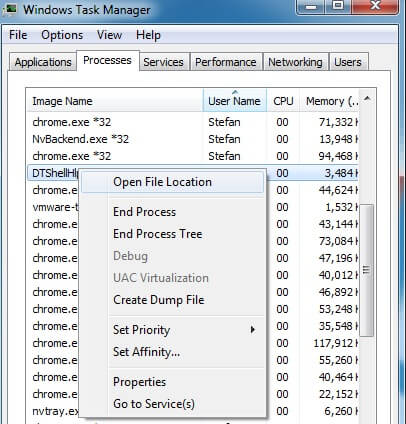
Right click on each of them and select Open File Location. Then scan the files with our free online virus scanner:

After you open their folder, end the processes that are infected, then delete their folders.
Note: If you are sure something is part of the infection – delete it, even if the scanner doesn’t flag it. No anti-virus program can detect all infections.

Hold together the Start Key and R. Type appwiz.cpl –> OK.
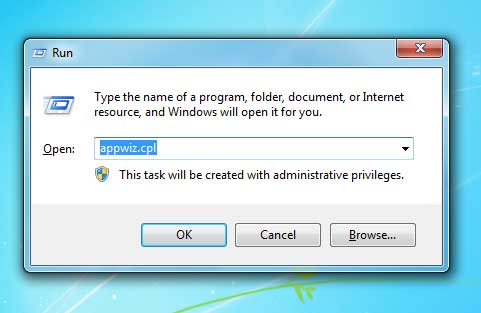
You are now in the Control Panel. Look for suspicious entries. Uninstall it/them. If you see a screen like this when you click Uninstall, choose NO:
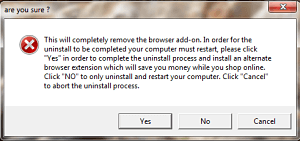

Type msconfig in the search field and hit enter. A window will pop-up:
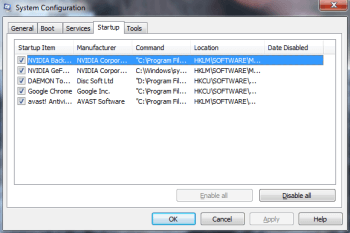
Startup —> Uncheck entries that have “Unknown” as Manufacturer or otherwise look suspicious.
- Remember this step – if you have reason to believe a bigger threat (like ransomware) is on your PC, check everything here.
Hold the Start Key and R – copy + paste the following and click OK:
notepad %windir%/system32/Drivers/etc/hosts
A new file will open. If you are hacked, there will be a bunch of other IPs connected to you at the bottom. Look at the image below:
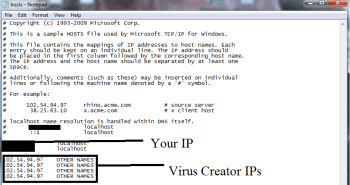
If there are suspicious IPs below “Localhost” – write to us in the comments.

Type Regedit in the windows search field and press Enter.
Once inside, press CTRL and F together and type the virus’s Name. Right click and delete any entries you find with a similar name. If they don’t show up this way, go manually to these directories and delete/uninstall them:
- HKEY_CURRENT_USER—-Software—–Random Directory. It could be any one of them – ask us if you can’t discern which ones are malicious.
HKEY_CURRENT_USER—-Software—Microsoft—-Windows—CurrentVersion—Run– Random
HKEY_CURRENT_USER—-Software—Microsoft—Internet Explorer—-Main—- Random
If the guide doesn’t help, download the anti-virus program we recommended or try our free online virus scanner. Also, you can always ask us in the comments for help!

Leave a Reply